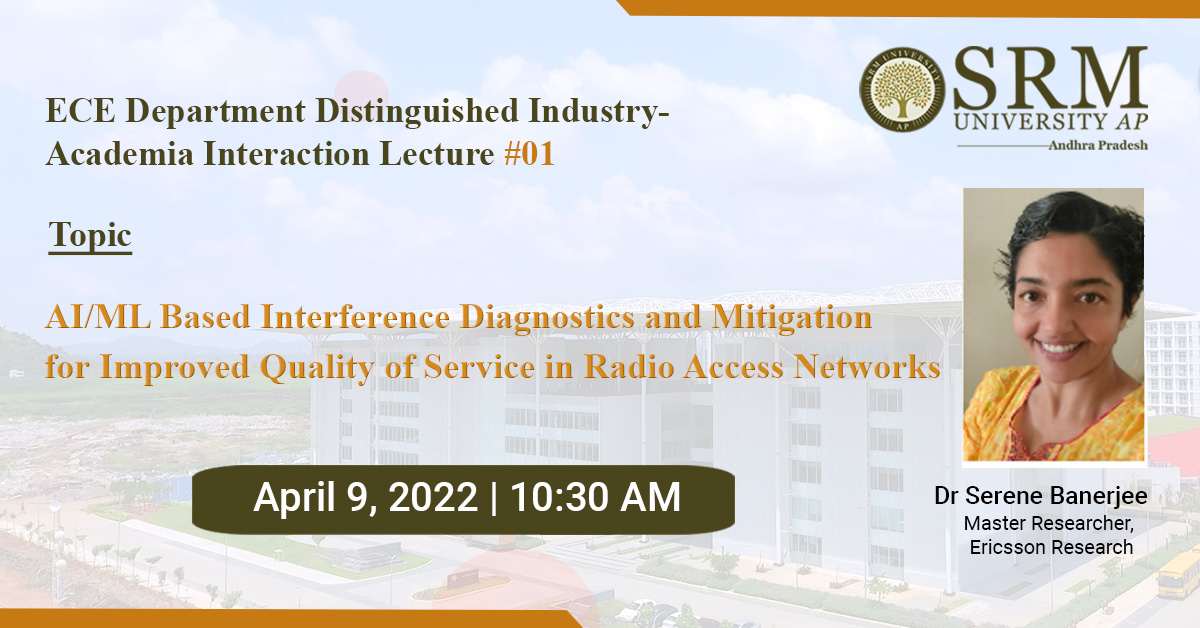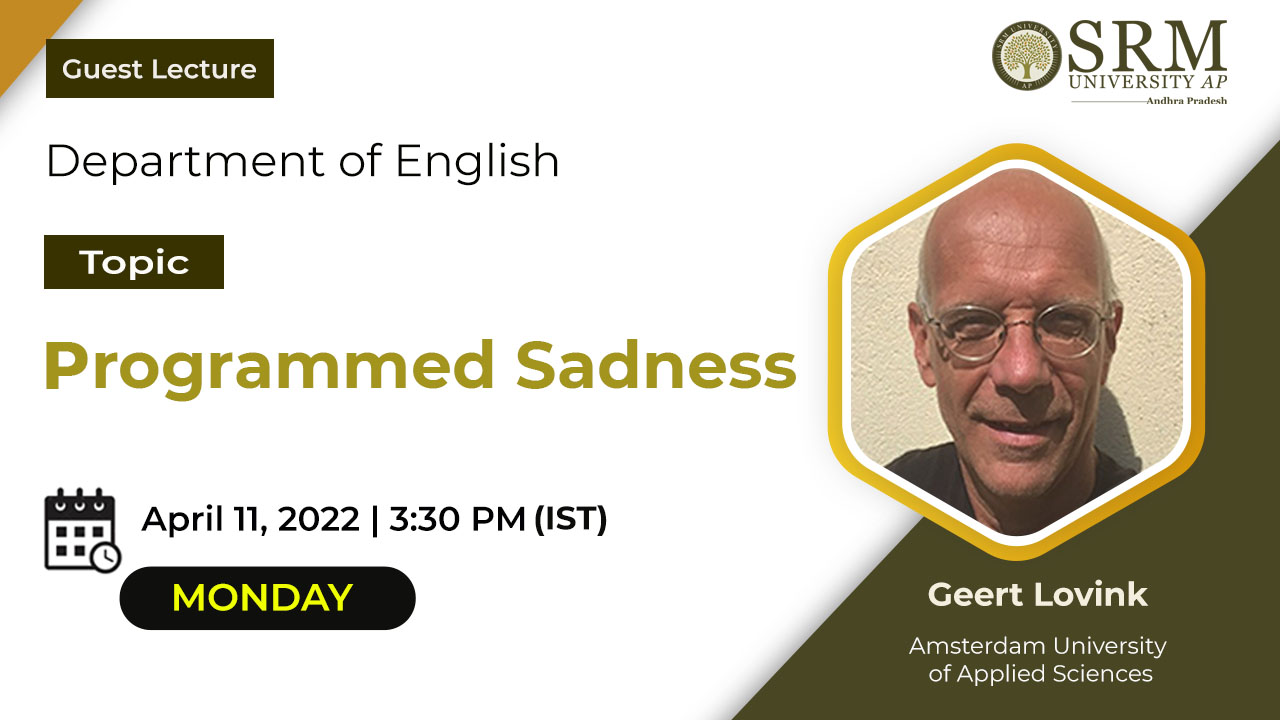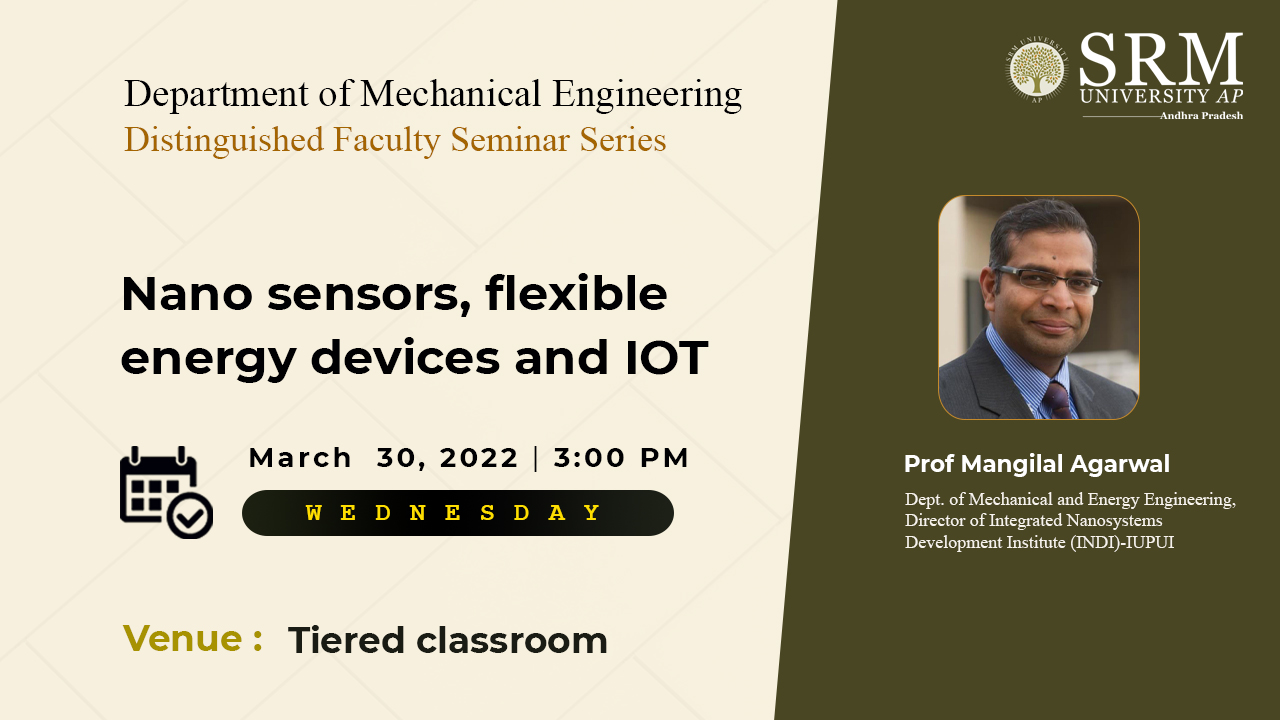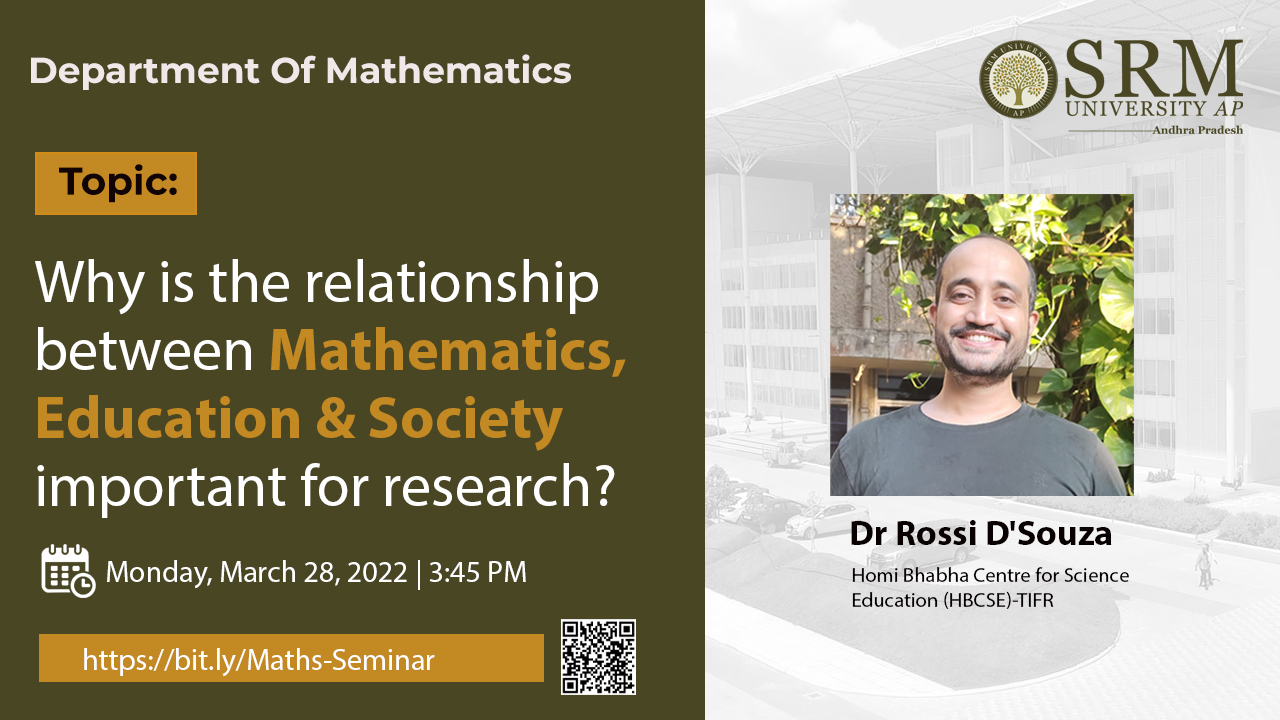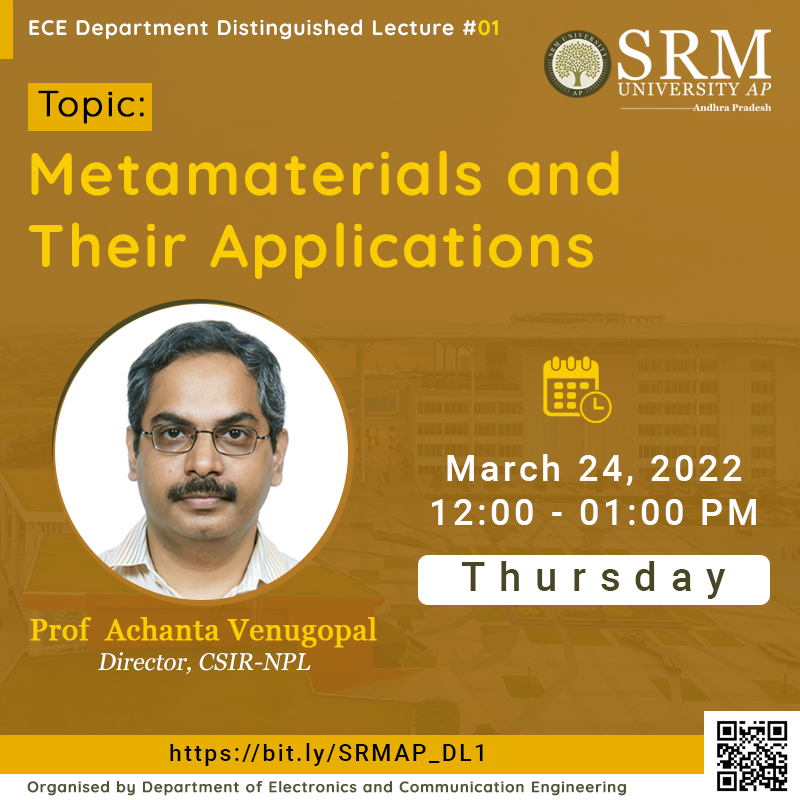SRMAP Departmental Events
- AI/ML algorithms for radio access networks April 7, 2022
The Department of Electronics and Communication Engineering is hosting the first instalment of the Distinguished Industry-Academia Interaction Lecture in the ECE DDIAL series. The event is scheduled on April 9, 2022, at 10.30 am. Dr. Serene Banerjee, Master Researcher, Ericsson Research, will be the keynote speaker. She will deliver a talk on the topic ‘AI/ML Based Interference Diagnostics and Mitigation for Improved Quality of Service in Radio Access Networks’.
Abstract of the Talk
For coverage and capacity optimization, Uplink Power Control is one of the key steps, in addition to antenna tilting and Downlink Power Control. For self-organizing networks, automated algorithms for Uplink Power Control are a necessity. However, Uplink Power Control affects the noise in the neighbouring cells. It is important to detect this interference to monitor uplink noise. Uplink noise due to power control manifests as static interference in the channel. The current state-of-the-art baseline model is based on regression models. We have proposed automated detection of static interference in the uplink channel of cells based on machine learning models. We have evaluated the same on customer data on LTE networks with high accuracy. The detected cells are subsequently used to correct the nominal power parameter through a proposed teacher-student model based on the primary cell and its neighbours. This approach shows better performance than the state-of-the-art baseline methods. The dual of static is dynamic interferences and can be attributed to traffic load, Passive Intermodulation (PIM) and thermal noise, etc. PIM identification is a major component in troubleshooting modern wireless communication systems. The introduction of carrier aggregation has increased PIM occurrences. Current state-of-the-art approaches include manual rule-based and hardware-based debugging. These approaches can detect the occurrence of PIM, long after the event occurrence and result in incurring incidental costs. We propose an ensemble of time series-based machine learning and signal processing approaches that can automatically identify PIM in real-time by analyzing Key Performance Indicators (KPI) of the primary cell and its nearest neighbours. We validate our results for various environmental conditions in data available from LTE and 5G consumer networks. We have further extended the work to multi-frequency time series to handle finer time granularities and detect PIM anomalies in an online learning setting. We further propose a self-supervised reinforcement learning approach to predict PIM related anomalies before it happens. We forecast environmental conditions that give rise to PIM based on offline historical data and model to predict future occurrences. Experimental results are on real-world datasets comprising 50,000+ cells which have shown to accurately predict PIM 60% of the time. To the best of our knowledge, this is the first work, where we are able to predict PIM anomalies before they happen. Post PIM-identification, we propose a binary search-based solution that is amenable to real-time implementation. We show through simulations that this search in tandem with a reinforcement learning-based solution can dynamically mitigate and cancel PIM. Results show that the number of steps to converge, to identify and mitigate the PIM in uplink frequency is reduced by a large factor. To summarize, our contributions include using machine learning algorithms for: (1) robust interference classification, (2) demonstrating p0-nominal recommender as teacher-student model, (3) a times-series analysis-based PIM identification, (4) extending the approach to multi-frequency time series, and for online learning, (5) demonstrating a self-supervised reinforcement learning approach to predict PIM anomalies before they happen, and (6) mitigating PIM, in spite of environmental unknowns, by employing binary search in conjunction with ML/RL-based approaches.
About the Speaker
Serene Banerjee, Master Researcher, Ericsson Research, has 17+ years of industrial experience after completing her PhD from the University of Texas at Austin, under Prof Brian L Evans in 2004. She has completed BTech(H) in Electronics and Electrical Communications Engineering from IIT Kharagpur in 1999. At Ericsson, she is focusing on developing AI/ML algorithms for Radio Access Networks. Prior to Ericsson, she has worked with Texas Instruments, HP, and Johnson Controls. She has 23 peer-reviewed publications, 9 granted patents, and several pending.
Join the webinar for an informative interaction with Dr Serene Banerjee.
Continue reading → - Programmed sadness in the desire for connections and recognition April 1, 2022
“Social media reality may be seen as a magical realm where we belong. That’s where the tribes gather, and that’s the place to be – on top of the world. Social relations in “real life” have lost their importance”– David Brooks
Technological sadness has become the default mental state of the online billions. The Department of English at SRM University-AP organises a guest lecture titled “Programmed Sadness” on April 11, 2022, to discuss the emotional analytics of network cultures. Prof Geert Lovink, Amsterdam University of Applied Sciences, will engage the participants at 3.30 pm on that day.
What happens when nothing can motivate you anymore, when all the self-optimisation techniques fail, and you begin to carefully avoid these forms of emotional analytics? Compared to others, your ranking is low – and this makes you sad. In this presentation, Dutch media theorist, internet critic and founder of the Institute of Network Cultures will discuss the dark side of the net. The mental state of internet users is tragic. Instead of empowerment and self-organisation, what we mostly see around is anger and despair. How did we end up like this? The lecture will zoom in on the widespread techno-sadness that is produced by dominant social media platforms through ‘behavioural modification’ (also known as ‘nudging’) with the aim to keep users coming back to the app, exposing them to even more personalised ads. Instead of empowerment and diversity, we witness a ‘chilling effect’ of hyper conformism, resulting in anger, sadness, depression and loneliness. This is the social reality today.
About the speaker
Geert Lovink is a Dutch media theorist, internet critic and author of Uncanny Networks (2002), Dark Fiber (2002), My First Recession (2003), Zero Comments (2007), Networks Without a Cause (2012), Social Media Abyss (2016), Organization after Social Media (with Ned Rossiter, 2018), Sad by Design (2019) and Stuck on the Platform (2022). He studied political science at the University of Amsterdam (UvA) and received his PhD from the University of Melbourne. In 2004, he founded the Institute of Network Cultures (www.networkcultures.org) at the Amsterdam University of Applied Sciences (HvA). His centre organises conferences, publications and research networks such as Video Vortex (online video), The Future of Art Criticism, and MoneyLab (internet-based revenue models in the arts). Recent projects deal with digital publishing experiments, critical meme research, participatory hybrid events and precarity in the arts. From 2007-to 2018, he was a Media Theory professor at the European Graduate School. In December 2021, he was appointed Professor of Art and Network Cultures at the UvA Art History Department.
All students and faculty members are invited to join this illuminating session on April 11, 2022, at 03.30 pm via the zoom platform.
Continue reading → - Nano sensors and Flexible energy devices March 30, 2022
The Department of Mechanical Engineering is hosting a Distinguished Departmental Faculty Seminar Series to encourage discussions on diverse aspects of the subject. Experts from various fields are invited to divulge their views and help students broaden their perspectives. The talk ‘Nano sensors, Flexible energy devices and IOT’ organised as part of the series will be held on March 30, 2022 at 3.00 pm IST. Prof Mangilal Agarwal, Director of Integrated Nanosystems Development Institute (INDI)-IUPUI is the distinguished speaker of the event. The talk will focus on Identification of volatile organic compound biomarkers in breath, development of integrated nanosensor systems and electrospinning epoxy/carbon nanotubes on carbon reinforced polymers for structural applications.
Speaker’s Profile
Prof Mangilal Agarwal is a full-time professor in the Department of Mechanical and Energy Engineering, Purdue University, Indiana, USA. He has an overarching vision to become an innovative leader in high-quality research and serve industry and government agencies in Indianapolis, the state of Indiana, and beyond.
Prof Agarwal has an array of interdisciplinary research projects at IUPUI involving big data, data analytics, machine learning, analytical chemistry, and mechanical engineering. Specifically, his research consists of canine-inspired chemometric analysis of volatile organic compound (VOC) biomarkers, developing integrated nanosensor arrays that detect VOC biomarkers sensitively or selectively, and enhancing carbon reinforced materials through electrospinning epoxy/carbon nanotube composite nanofibers.
Over the years Prof Agarwal’s research has been well received and funded through numerous grants from the National Science Foundation (NSF), National Institute of Health (NIH), Department of Defense (DoD) and the industry.
Prof Agarwal has previously served as the Associate Director for Research and Development for the IUPUI Office of the Vice Chancellors for research and is currently the Director of Integrated Nanosystems Development Institute (INDI) at IUPUI, which strives to advance nanotechnology research, education, and outreach.
- Breaking the Mathematics myth March 26, 2022
Have you ever thought Mathematics is a hard nut to crack? The Department of Mathematics brings to you Dr Rossi D’Souza to break the myth associated with Math. The seminar will be held on March 28, 2022 at 03.45 pm IST. Dr D’Souza, from Homi Bhabha Centre for Science will deliver a talk on ‘Why is the relationship between Mathematics, Education & Society important for research?’.
Abstract of the Talk
“Mathematics is hard!” has been a universal refrain among school children (and often their parents) for as long as we recall. But why do so many children dislike Mathematics? Is it the way Mathematics is taught – because Math teachers follow a “rote-learning” approach instead of making sure students understand the basic concepts? Why are students from marginalized backgrounds/identities disproportionately lagging behind in & excluded from Mathematics knowledge production? Or is Mathematics really not for everybody?
Drawing on experience from his PhD research with visually challenged students and industry experience the speaker will highlight the importance of taking into account the social factors in Mathematics Education Research to effectively address the challenges posed by STEM Education – and to work towards a world where Mathematics really is for everybody!
Speaker’s Profile
Dr Rossi D’Souza recently completed his PhD in Mathematics education from HBCSE-TIFR. His research interests include exploring how ableism operates in Mathematics education. Prior to working as a Research scholar, Rossi completed his M.Tech in Modeling and Simulation from Pune University, specializing in and then working in the field of Computational Genomics. He has also worked as a visiting lecturer at Govt. Polytechnic Mumbai, as a medical instrument repairman at Narayana Hrudayalaya Hospital, Bangalore and as a Science Communicator on the Science Express train.
Join the session with Dr D’Souza and make your Mathematics learning a delightful experience.
- Metamaterials and their applications: Distinguished Lecture Series March 23, 2022
The Department of Electronics and Communication Engineering is hosting the first segment of the ECE Department Distinguished Lecture Series on March 24, 2022, from 12.00 pm to 01.00 pm IST. Prof Achanta Venugopal, Director, CSIR-NPL is the distinguished speaker of the event. He will be delivering a talk on the topic “Metamaterials and their Applications”.
Abstract of the Talk
Metamaterials are designed materials with unique properties that may not exist in naturally available materials. These are designed with sub-wavelength size components. In this talk, after briefly introducing metamaterials, the speaker will discuss on a few metal-dielectric and all dielectric metamaterials and their applications in wide-ranging areas covering stealth, single-photon emitters, reusable biosensors among others.
Speaker’s Profile
Venu Gopal Achanta obtained his PhD in Physics from Tata Institute of Fundamental Research, Mumbai and PhD in Electronics from Tokyo University, Tokyo, Japan. He is currently the Director of CSIR-National Physical Laboratory, Delhi. He is on lien from Tata Institute of Fundamental Research, Mumbai where he is a professor in the Department of Condensed Matter Physics and Material Science. He has served in various TIFR committees as chair and member. He is also on the senates of IISER, Berhampur and IIT, Delhi. He is a member of the executive council of Optical Society of India, vice-chair of IEEE Photonics Mumbai chapter and member of the program committee of the Association of Asia Pacific Physics Societies – Division of Condensed Matter Physics. He is on the editorial board of journals, Scientific Reports, Frontiers in Physics, Encyclopedia of Applied Physics, and the Indian Journal of Pure and Applied Physics. He is an honorary Fellow of the Metrology Society of India and senior member of IEEE. His research interests are in nano and quantum photonics with over 140 journal publications.
Join here for an insightful session with Prof Achanta Venugopal.


